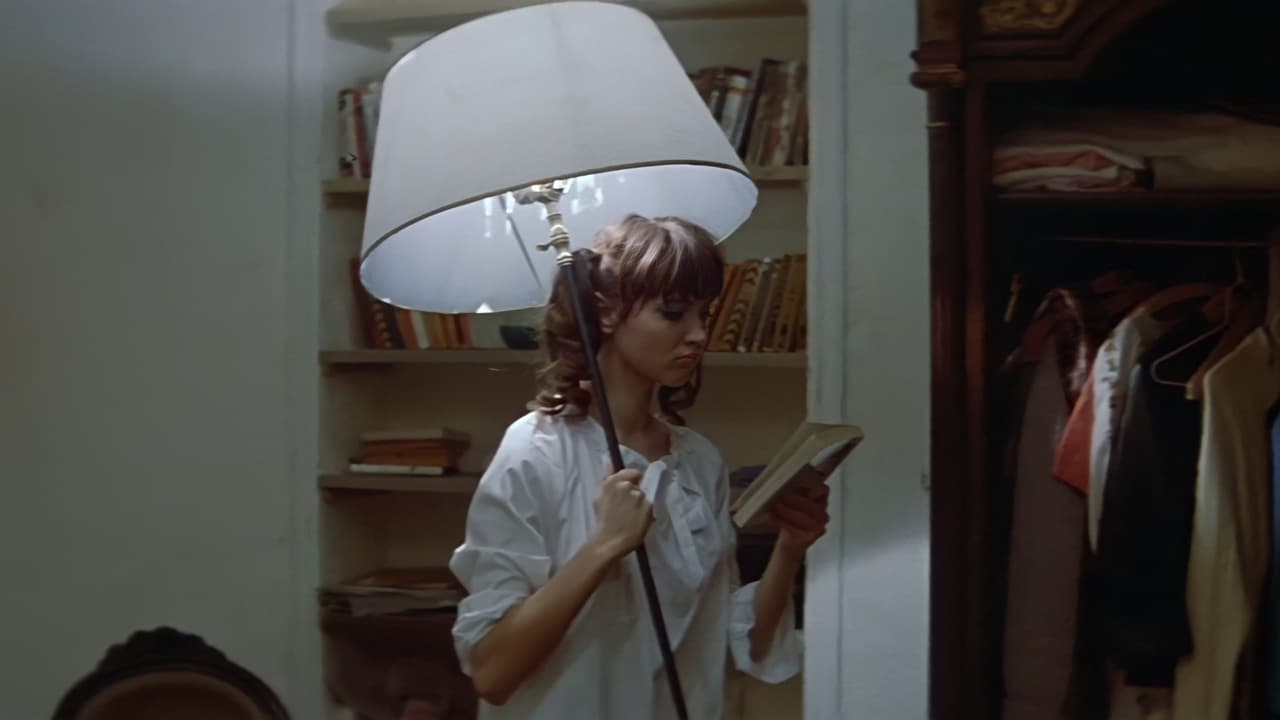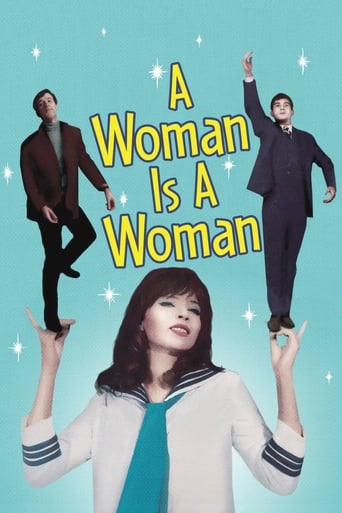

Who payed the critics
... View MoreBy the time the dramatic fireworks start popping off, each one feels earned.
... View MoreThe movie's not perfect, but it sticks the landing of its message. It was engaging - thrilling at times - and I personally thought it was a great time.
... View MoreOne of the most extraordinary films you will see this year. Take that as you want.
... View MoreTaking as his jumping off point the American musical-comedies of the 1950's, Godard then totally subverts them, following his debut masterpiece "Breathless" with something even more radical. "Une Femme est une Femme" is, on the one hand, Godard's most accessible film while being, at the same time, totally unconventional, even perversely so. It's like a home-movie in Cinemascope and colour and his use of colour and widescreen is up there with Minnelli and Sirk even as his script and his actors veer off into places his mentors would never have considered.Anna Karina stars as the young stripper who wants to have a baby, either by Jean-Claude Brialy or Jean-Paul Belmondo, (she isn't too fussy), and she looks gorgeous. The camera loves her even if what she is doing up there on the screen might not quite approximate to 'acting' any more than what Godard is giving us could be called a typical film. This is the kind of movie that cemented his reputation and as many people hate it as love it. However, unlike many of his later films, (the out-and-out political ones), the last thing you could call this is boring.
... View MoreCharmer from Jean-Luc Godard stars a very appealing Anna Karina as an exotic dancer, Angela, wanting a child from her store owner boyfriend, Émile Récamier (Jean-Claude Brialy). Émile, however, isn't particularly interested in a child or marriage, but just keeping their relationship as it is currently. Angela begins to ponder moving on from Émile in favor of her ne'er-do-well friend, Alfred Lubitsch (French New Wave icon, Jean-Paul Belmondo). A ditsy love triangle develops but it never rises to anything all that melodramatic as Godard keeps the tone light and fluffy. Still, Godard incorporates intertitles, editing techniques, camera pans (two such instances has the camera doing a complete turn to the right and left inside the little apartment Angela and Émile share), ebbs and flows in the musical scoring (to emphasize the playful banter and antics that poke fun at each other that exists between Angela and Émile) in order to give his film a sense of unpredictable and off-the-cuff style that isn't what you normally see in a romantic comedy. There's even a bit of a sing-songy method in how Angela addresses Émile at times when they do this back-and-forth « sizing each other up » flirty (and purposely antagonistic in a less imposing as much as mischievous way) dialogue in regards to topics that range from the aforementioned child talk to « what's for supper ». It fits neatly into the French New Wave era with its use of Parisian locations (Godard even « goes crazy » by shooting actual people just trafficking through while Angela convinces a discarded Communist to join a exotic dancing establishment). Jeanne Moreau even cameos for Godard in a conversation with Belmondo about her film, Jules et Jim ! Another scene has Angela talking with a friend about Shoot the Piano Player, done in a type of kidding form of charades. Respect like that is often added to films of Godard's for Truffaut. The « presentation in Eastman color » and the « use of Cinemascope » seems to indicate that Godard, along with several of his contemporaries working at that time, was reaching a significance as a filmmaker a prominence. But Karina's enchanting presence and bewitching beauty is so captivating, his techniques are only enhanced because she is in his film. Belmondo has one of those archetypes that worms his way out of paying debts, a hanger-on slacker who just so happens to have enough charisma, clever wit, and sense of humor to get by. Karina knows he's not for her, but even considering him as a suitor (he tells her he loves her) is an indication that Brialy is failing her. Of course emerging with « I want a baby » out of the blue does kind of serve as a surprise. The couple have a way of provoking each other. A particularly memorable couple of scenes has them using the titles from books on their shelves to communicate how they feel using a lamp light to guide their way through the apartment and a source to emanate the exact words meant to provoke reaction. I think A Woman is a Woman is a showcase for Karina's lighter side and the whole film is presented in a manner that doesn't attempt to cause us to look much deeper than the surface ; except perhaps once scene where Karina, when listening to a jukebox song chosen by Belmondo, attentively understands what Braily means to her, and another that has Belmondo mentioning a newspaper article regarding a love triangle and two letters sent to two lovers by a woman. I think after you watch enough Godard, if you don't like "dialogue movies" then perhaps he isn't for you. The camera, as always did, adores Karina. Photogenic doesn't even begin to describe how she lights up a screen. To kind of give you an idea of where the couple is in their relationship, Braily refers to Karina affectionately "pet".
... View MoreJean-Luc Godard's first two films (À bout de soufflé and Le petit soldat) were thrillers that drew inspiration from American noir, but UNE FEMME EST UNE FEMME (A Woman is a Woman, 1961) shifts gears drastically to a riff on American musical comedies, with the characters occasionally singing and dancing, and the camera jumping between realistic depictions and these musical interludes. But as one of the seminal figures of the French New Wave with its desire to shake up conventions, Godard added some elements of his own. As the film opens, the soundtrack keeps cutting abruptly in and out, an aural equivalent of the unsettling jump cuts with which he started his career. There are allusions to his earlier films and to his New Wave peers, and just a touch of sarcastic allusions to French political tensions.The plot is fairly simple: cabaret dancer Angela (Anna Karina), who is clearly not looking to buck any traditional sex roles in an age of dawning feminism, wants a baby. Unable to get it from her partner Émile (Jean-Claude Brialy), she gradually welcomes the advances of Émile's best friend Alfred (Jean-Paul Belmondo). The way in which this triangle ultimately works out is a little surprising considering that it was made in 1961. The most appropriate adjective overall for this film is "cute". The characters spend a lot of time bickering, but always with witty ripostes. Karina here is not yet the great actress of later roles, and Godard uses her instead as essentially a Barbie doll (nice to look at, not much there), but it works well enough for this particular story. The film was shot with no fixed script, and why it's not a free-for-all, there are clearly improvisational elements here that only add to the film's charm, such as the characters' encounters with everyday Parisians in street scenes.
... View MoreWoman is a Woman, A (1961)** 1/2 (out of 4) A woman (Anna Karina) decides she wants to have a baby but when her boyfriend (Jean-Claude Brialy) refuses she decides to turn to his best friend (Jean-Paul Belmondo). It's no secret that I've had a love/hate relationship with Godard and this one here was somewhere in the middle. I thought the opening forty-five minutes, as strange and surreal as they were, were entertaining and the weird nature of the movie kept me going but then the movie just hit a wall with me and was never able to recover. What I liked about the opening half was Godard's (apparent) spoof of Hollywood melodramas as our beloved stripper goes on and on about stupid topics that, in a melodrama, would take thirty-minutes to go through and would end up with a big finale with over-dramatic tensions building up and eventually exploding. The way Godard handles this stuff through the music, the surreal scenes and the constantly moving camera was very well done and it was working on me. I'm really not sure what happened after that but there's a scene inside the strip club where the boyfriend and his friend are sitting with a couple women and the woman is with another man. Once again we get a very good scene with the camera floating back and forth between the parties but right after this the movie just fell apart. I guess I finally got tired of its cuteness and self-indulgent ways. I really had a hard time caring or following the woman and her choices. I thought the three leads all gave very good performances but that didn't save the movie for me.
... View More